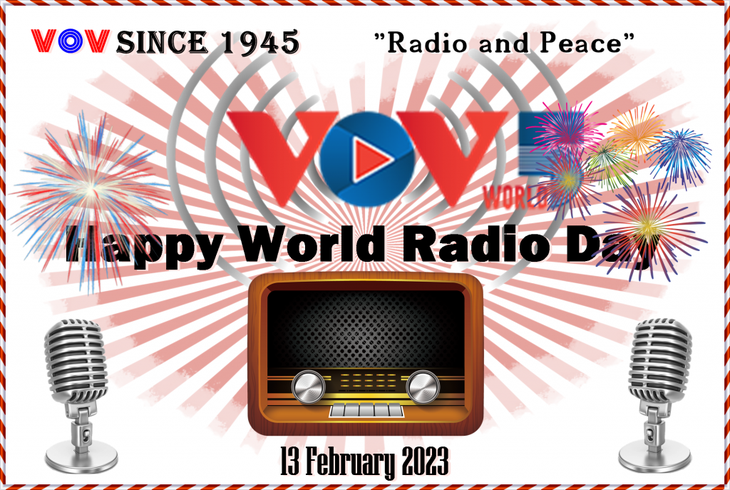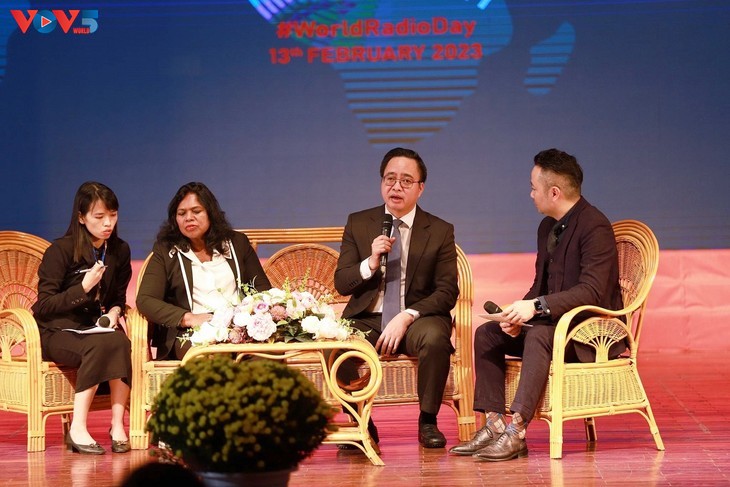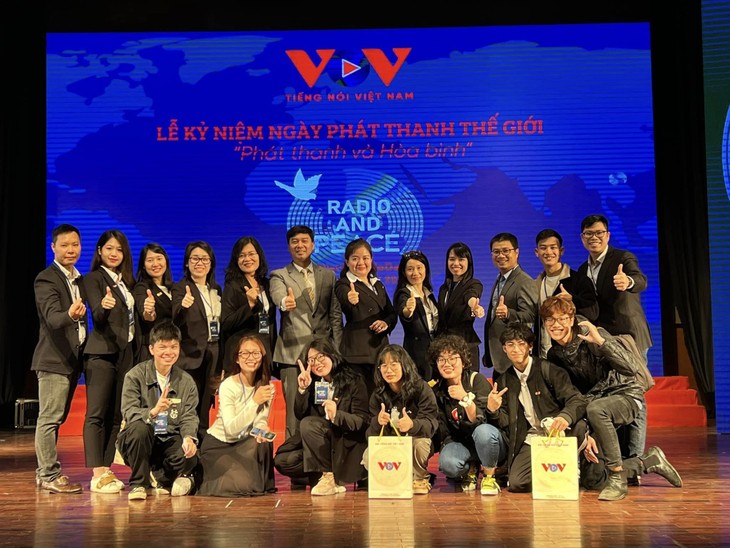 Thank you Omar Lassas of Algeria for the ecard! Thank you Omar Lassas of Algeria for the ecard! |
B: Amir Jameel of Pakistan said: “World Radio Day is a celebration of the role of radio as a means of communication and expression. It is important to understand the role of radio and how it has helped people to stay updated with the news. Radio allows listeners to stay in touch with the outside world regardless of age or location. On radio everything is available.”
A: We have received a lovely ecard from Omar Lassas of Algeria. He designed it on a background of VOVWorld’s logo. Rabi Sankar Bosu of India also sent us three ecards of him and members of the New Horizon Radio Listeners’ Club in West Bengal. They show men, women, and children listening to the radio together.
 Rabi Sankar Bosu and members of the New Horizon Radio Listeners’ Club in West Bengal, India. Rabi Sankar Bosu and members of the New Horizon Radio Listeners’ Club in West Bengal, India. |
B: Bosu conveyed his best wishes and congratulations to all VOV’s staff and listeners. He wrote: “On this day broadcasters as well as radio enthusiasts around the world celebrate century-old radio as a medium that can inform, educate, and support free speech. World Radio Day is a golden moment for all broadcasters around the world, and also an opportunity for radio listeners of different countries to come closer to the broadcasters.”
A: Shivendul Paul, a member of the VOV Fan Club of India, sent greetings to all staff and listeners of Voice of Vietnam. He said: “Nowadays war is a part of our life. We faced the COVID pandemic. We are not at peace. This year UNESCO’s World Radio Day is themed Radio and Peace. Radio gives us a message of peace, a voice of love.”
B: The VOV Fan Club in India is like a social organization. It often holds events and social activities to engage the local community. Shivendul told us: “To increase radio listeners in India and celebrate World Radio Day we organized a Listeners’ Conference and DX Radio Exhibition in Murshidabad. In March we will organise a Radio Festival-Listeners’ Meet, DX’ing exhibition, philatelic exhibition, quiz, and award ceremony. We’ll publish a radio magazine called Betar Bhuban.”
A: Congratulations for holding many activities to give radio a wider audience footprint, reaching millions who have no access to the Internet.
 VOV's Vice President Pham Manh Hung (second from right) speaks at the "Radio and Peace" talk (Photo: Duc Anh/VOV) VOV's Vice President Pham Manh Hung (second from right) speaks at the "Radio and Peace" talk (Photo: Duc Anh/VOV) |
B: On Monday VOV held a "Radio and Peace" talk show to honor radio broadcasters and promote radio as a means of conflict prevention and peace-building. At the event VOV5’s broadcasters sang “The song of VOV’s overseas broadcast.”
The lyrics go: “We send our voices to all corners of the country. We send our voices to all five continents. This is the voice of friendship, the voice of Uncle Ho, the voice of a brighter future.”
A: VOV held a discussion for radio managers, broadcasters, and representatives from the Asia-Pacific Broadcasting Union to exchange experience and ideas to promote radio’s effectiveness in preserving peace worldwide. Christian Manhart, UNESCO Representative in Vietnam, said the celebration reminds radio stations that they should work to fight disinformation and fake news that may cause division, conflict, and war.
“UNESCO underlines the important of supporting radio through capacity building for increased professionalism, adequate legislation and regulation, assistance toward digital transformation, and also financial assistance, and also respect for editorial independence," Christian Manhart said.
B: Radio host, reporter Cong Vinh from the Voice of Ho Chi Minh City shares his thought: “Radio is hearing. It has the power to convince people if we have an appropriate way to convey our messages. Radio broadcasting should focus on content with strong messages. Our strong messages can be broadcast on different platforms to reach people and touch the audience’s conscience and mind.”
A: Once again, thank you all for supporting VOV broadcasts and tuning in to our channels over the years. VOV will continue to be on the air to live up to your expectations.
 VOV staff and students of journalism attend World Radio Day celebration at VOV's headquarters. VOV staff and students of journalism attend World Radio Day celebration at VOV's headquarters. |
B: We are reading a letter from Fumio Hokamura of Japan. He listens to us every day and writes to us almost every week. In a letter dated January 11, Fumio asked about the history of Vietnam’s movie industry and the recent development of Vietnamese cinema.
B: In 1953, President Ho Chi Minh signed a decree establishing the Vietnam Movie and Photography Enterprise, the official agency of Vietnam’s film industry. Before that Vietnam’s movie sector had made some battlefield documentaries.
A: In 1959 the first Vietnamese movie Chung một dòng sông (Sharing a river) was premiered, a love story about a couple divided by the 17th parallel along the Ben Hai river. From 1960 to 1975 Vietnam’s cinema produced mostly documentaries and movies about the war and about production in the rear during war time.
B: After Vietnam was reunified in 1975, films portrayed post-war life and production across the country.
A: The renewal period of the 1990s created conditions for movies to boom. This period also marked a number of foreign collaborations like The Lover and Indochine.
B: The Vietnam Cinema Association organized its first movie award in 1994, the precursor of what is now the Golden Kite award. In 2010 the first Hanoi Film Festival was held, drawing submissions from 22 countries and territories. This period saw strong competition among domestic film producers and overseas Vietnamese filmmakers returning home.
A: Over the last decade modern cinemas have been built across the country. Vietnamese audiences can now see foreign films at the same time as audiences in other countries. Many foreign blockbusters have been filmed in Vietnam, like “Pan” and “Kong-The island of skulls”.
B: The 6th Hanoi International Film Festival was held last November, drawing 400 films from 68 countries and territories. 190 films were screened at the National Cinema Center, the BHD Cineplex, CJ CGV, Galaxy, and multiple outdoor venues.
A: The New Year holiday is the best time for film producers to debut their new movies. Three Vietnamese movies screened during the last Lunar New Year holiday were “Sister Sister”, “Super Cheaters”, and Mrs. Nu’s Family”.
Here are some audience responses to “Mrs. Nu’s Family”.
“It’s lifelike. The conversations make people think. Am I too selfish? Do I care too much about my children?"
“I see myself in the main female character. Sometimes I can't see myself. We need other family members to remind us to be more restrained and think about others.”
“The movie is interesting. It’s close to life and I see part of me in it. I appreciate movies like this, which help promote tourism sites in Vietnam.”
B: That’s a brief introduction to Vietnamese cinema. Vietnamese movies and music are widely available on apps like Netflix, Youtube, and Spotify.
A: This week we acknowledge reception reports from Hayato Furukawa of Japan, and Dawood Jabarkhail and Israr Ahmad Chaudhary of Pakistan. We appreciate you sending us voice messages so your voices can be heard on our channel.
B: Our address is English Service, VOVWorld, the Voice of Vietnam, 45 Ba Trieu street, Hanoi, Vietnam. Or you can email us at: englishsection@vov.vn. You’re invited to visit us online at vovworld.vn, where you can hear both live and recorded programs.
A: Once again, thank you all for listening. Goodbye.